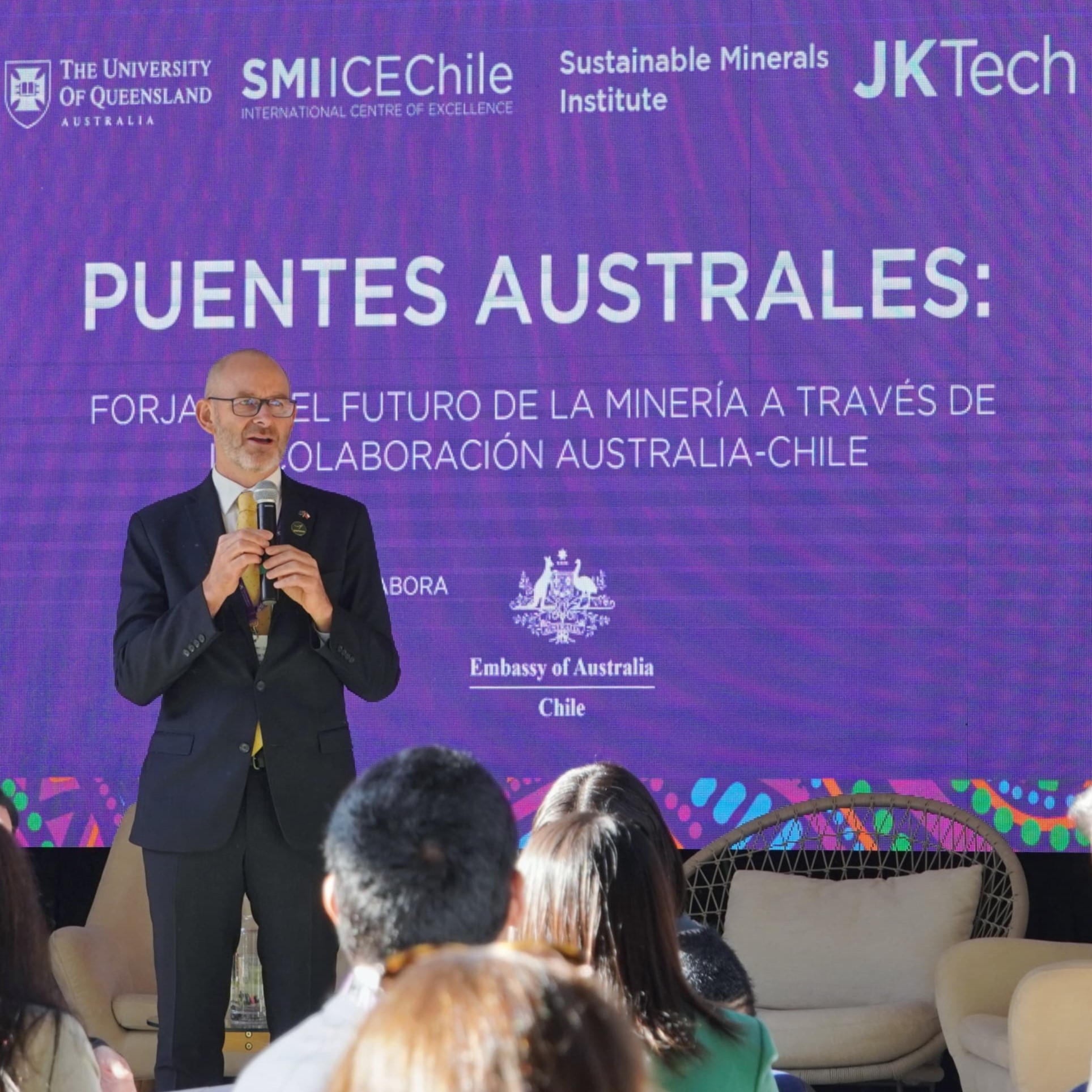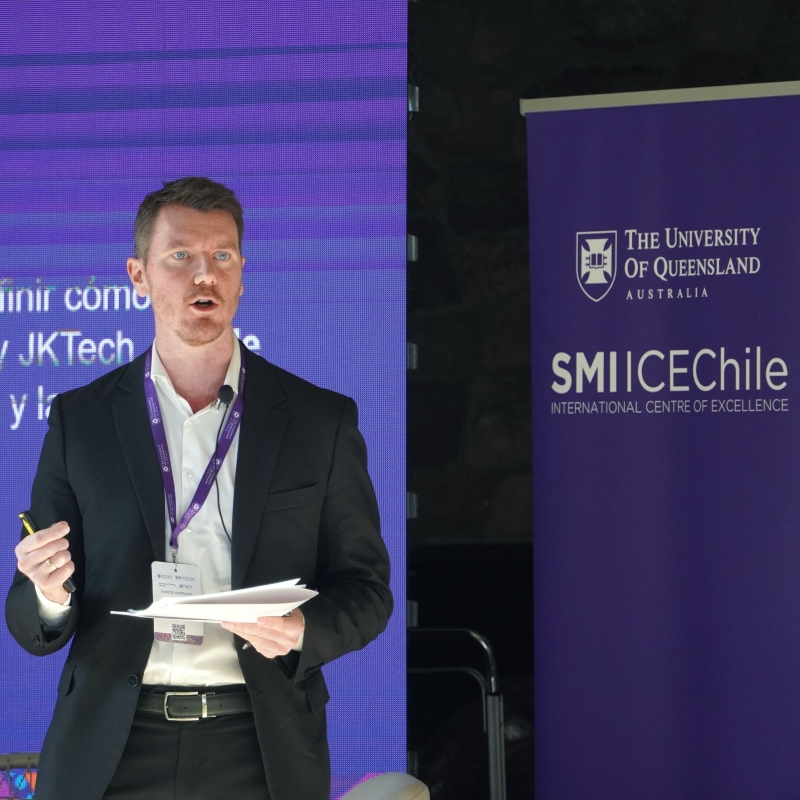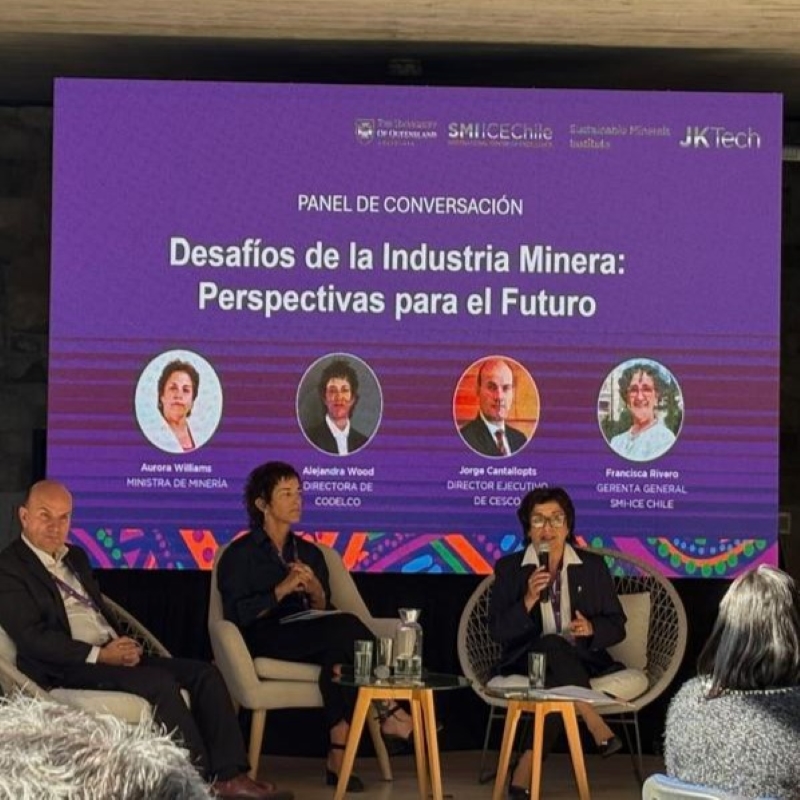
Chilean Mining Minister Aurora Williams, leaders of the main mining companies operating in Chile, union representatives, academics and experts from the University of Queensland and the technology transfer company JKTech were all present for the SMI-ICE-Chile event called "Puentes Australes: Forging the future of mining through Australia-Chile collaboration."
More than 50 guests attended the residence of the Australian Embassy in Santiago, to discuss and explore ways of collaboration on the most critical challenges of mining today: increasing production in a complex scenario, creating social value and adapting to climate change, among others.
"Puentes Australes" was attended by executives and representatives of partner companies such as Codelco, Antofagasta Minerals, BHP, Anglo American, Rio Tinto, Lundin Foundation, Feeport-McMoRan, Enaex, Mitsubishi Corporation (MCI), among others; authorities and representatives of CESCO, Sernageomin, SONAMI, the Mining Council, Trade and Investment Queensland (TIQ), the Universidad Católica del Norte, the Universidad de Chile and the Universidad del Desarrollo also attended.
This event was opened by Ambassador Andrew Martin, who highlighted the work of SMI-ICE-Chile in favor of more sustainable mining. "We are very proud of the work carried out in Chile by this Center of the University of Queensland," he said. "Chile and Australia are mining countries that have a lot to say in terms of innovation in mining, and these types of meetings are to go in that direction."
From Australia, Beatriz de la Fuente, Ambassador of Chile to Australia, sent a video message where she highlighted SMI-ICE-Chile as an example of the collaboration between both countries in the search for a sustainable future. "Mining is one of the central pillars of the link between the two countries, as well as the search for sustainable and responsible solutions to the main challenges facing this industry. We have been working together in this direction for years and we see ample room to continue collaborating in this spirit. SMI-ICE-Chile and the University of Queensland are an example of how to combine international academic excellence with industrial collaboration to develop sustainable solutions."
Next, the executive director of SMI-ICE-Chile, Doug Aitken, explained the meaning of this meeting. "We are here because, from the University of Queensland, the Sustainable Minerals Institute and our Center in Chile, we want to add value for our industry partners and for society in general," he emphasized. "And we are convinced that the way to do this is through collaboration.
"As Jorge Cantallopts said a few days ago in #CescoWeek, when you think of a Chilean product of excellence, the first thing that comes to mind is Chilean wine. We must aspire for Chilean mining to also be recognized in the world for its excellence and responsibility. And this is a challenge that we are called to work on and collaborate all together."
The first part of this meeting consisted of a discussion led by Francisca Rivero, general manager of SMI-ICE-Chile, with the participation of the Minister of Mining Aurora Williams, the executive director of CESCO, Jorge Cantallopts and the director of Codelco, Alejandra Wood.
"For Chile, Australia is a world benchmark in mining," said Minister Aurora Williams. "Without a doubt, we have made a lot of progress in responsible production and that can be measured through various standards, but I believe that global players can provide us with the best practices of world standards. Today the variable of responsible production is very present in all markets, mainly because the central challenge is to face climate change, a task that we must address without generating greater negative externalities. The way to distinguish ourselves is that our clients choose minerals that are produced in Chile in a responsible way. There is a lot to improve, but I think we are on the right track, because we are also doing it collaboratively, both nationally and globally."

Alejandra Wood Huidobro referred to the challenge of how to increase production without causing a negative social and environmental impact, in the context that Codelco has declared sustainable development as a pillar of its corporate strategy. "It is no longer possible to do mining as in the past," she said. "Today responsible mining is demanded, which opens up a tremendous opportunity for us. At Codelco we face complex technical, organizational and strategic challenges, which are not only solved by increasing production but also by mining in a cleaner, more efficient and resilient way. The world needs more critical minerals for the energy transition, but minerals that come from responsible sources. An essential part of this transformation has to do with leadership that understands that communities are not just another actor but part of the success equation, and with teams aware of the impact of their decisions and capable of adapting to changing contexts."
The executive director of CESCO, Jorge Cantallopts, focused on the importance of favoring public-private partnerships, such as the recent signing of a memorandum of understanding between CODELCO and Anglo American in Los Bronces. "To promote more alliances in this line, we need impulses with State perspectives, capable of generating permanent, long-term policies.
"As an industry we have very critical common challenges," he continued, "and in that sense I do not understand why there is not, for example, an institute that studies chalcopyrite, because the challenges we have in the extraction and metallurgy of primary sulfides are greater than in any other mineral. Improving the recovery by 1% of the metals we have today represents about 5 billion dollars in ten years. These are efficiency challenges that can be aligned with sustainability, and that's where our R+D efforts should be.
"The mining liabilities and tailings that we have in Chile represent a common task for large mining companies. Trying to incorporate circularity into tailings is a tremendous opportunity. What we leave each year in ore, either in tailings or tailings, must be between 500 thousand and 1 million tons of copper that were not recovered. It is something difficult to transform into a business, but you don't only have to think about it in terms of sales, but also about how the territory can be recovered by reducing tailings."

To the question of how to generate social value in mining territories, Minister Williams responded that it is a commitment in the territory that goes far beyond providing employment or work to suppliers. "The mining industry is global and, therefore, more is expected of it. The commutation that usually occurs generates a lot of asymmetry and we see territories with great mining development, but without a commensurate social development (...) The territories aspire to have greater resources, but also to make decisions in a decentralized way about those resources. I believe that today the Royalty Law reflects this aspiration," she said, "The relationship between a mining company and the territory must move from the logic of compensation to one of shared value," added Alejandra Wood. "It is not only about being a good neighbor, but about being an active part of a territory in order to contribute to its long-term development."
On behalf of the Sustainable Minerals Institute at The University of Queensland, Dr. Juliana Segura Salazar presented the technological development Ore-Sand, a circular economy solution to reduce mineral waste and improve the overall sustainability of sand.
In addition, throughout the meeting, video capsules were presented where some of the main experts of the Sustainable Minerals Institute presented their capabilities and advances in innovation and sustainability, pointing out the certain possibility of an interesting way of collaboration with the Chilean industry.
The last part of "Puentes Australes" distributed the participants in working groups to identify the challenges of mining in the short, medium and long term and concrete actions to promote the transformation of the industry. This work will lead to a synthesis and a collaboration plan by the SMI-ICE-Chile team, which will be distributed soon to the participants of Puentes Australes.



